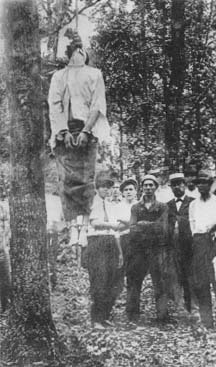Leo Frank Trial: 1913
Frank Convicted, Commuted, And Lynched
On September 26, 1913, after one of the longest trials in Georgia history, the jury found Leo Frank guilty of the murder of Mary Phagan. Judge Roan sentenced Frank to be executed by hanging on October 10, but the execution was stayed by the defense lawyers' appeals. On February 17, 1914, the Georgia Supreme Court upheld Frank's conviction, although two judges dissented. The defense lawyers, however, did not give up. They pursued evidence that Conley had committed the murder: Witnesses had seen Conley washing his bloody clothing at the factory after the murder, Conley's girlfriend gave testimony concerning Conley's perverted sexual tendencies, and Conley's own lawyer told Judge Roan that Conley had confessed to the murder to him.
Despite the evidence of Conley's guilt and therefore Frank's innocence, Judge Roan refused to overturn the verdict and the Georgia Supreme Court again affirmed on October 14, 1914. On December 9, 1914, Frank's execution was rescheduled for January 22, 1915, but it was again stayed, this time by the defense lawyers' habeas corpus petition (release from unlawful confinement) to the U.S. Supreme Court. On April 19, 1915, the Court denied the petition, despite the strong dissents of Justices Oliver Wendell Holmes and Charles Evans Hughes.
Frank's last chance was an appeal to the governor of Georgia, John Slaton, for commutation of his sentence. This appeal began with a hearing on May 31, 1915, before the Georgia Prison Commission. On June 9, 1915, the Commission voted 2-1 against recommending commutation to the governor. Slaton, however, was an independent man, and had on several occasions used his power to grant clemency when in his opinion justice demanded it, regardless of the unpopularity of his decision. On June 21, 1915, Slaton commuted Frank's sentence to life imprisonment, citing the widespread national criticism of Georgia justice and the many doubts raised over the evidence against Frank.
 Leo Frank was lynched for the murder of Mary Phagan.
Leo Frank was lynched for the murder of Mary Phagan.
This case has been marked by doubt. The trial judge doubted. Two judges of the Court of Georgia doubted. Two judges of the Supreme Court of the United States doubted. One of the three Prison Commissioners doubted.
As he probably foresaw, Slaton's decision was instantly unpopular in Georgia. There were demonstrations in Atlanta and in Marietta, Phagan's home town, and sporadic acts of vandalism against Jewish homes and stores. On August 16, 1915, a vigilante group drove from Marietta to the Milledgeville Prison Farm outside Macon, Georgia. They overpowered the skeleton crew of prison guards and took Frank from his cell. The vigilantes drove back to Marietta, a seven-hour trip, with Frank. Once back in Marietta, a lynch mob of local citizens gathered and watched as Frank was hung from a tree limb on the morning of August 17, 1915. The racist hatred stirred up by the Frank trial did not end with Frank's lynching. For decades, the "vindication" of Mary Phagan was a rallying cry for the resurgent Ku Klux Klan.
In 1982, an old black man named Alonzo Mann, who had worked at Frank's pencil factory as a child, publicly declared that he had seen Jim Conley drag Mary Phagan's corpse to the basement but had kept silent because Conley had threatened to kill him. On March 11, 1986, the Georgia State Board of Pardons and Paroles posthumously pardoned Frank.
—Stephen G. Christianson
Suggestions for Further Reading
Dinnerstein, Leonard. The Leo Frank Case. Athens, Ga.: University of Georgia Press, 1987.
Liebman, James S. "Lesson Unlearned." The Nation (August 1991): 217.
Lindemann, Albert S. The Jew Accused: Three Anti-Semitic Affairs (Drevfus, Beilis, Frank), 1894-1915. New York: Cambridge University Press, 1991.
MacLean, Nancy. "The Leo Frank Case Reconsidered: Gender and Sexual Politics in the Making of Reactionary Populism." The Journal of American History (December 1991): 917-948.
Oney, Steve. "The Lynching of Leo Frank: Two Years Ago, and Seventy Years Too Late, a Witness Came Forward to Prove That Frank's Only Crime was Being a Stranger in the Old South." Esquire (September 1985): 90-98.
Phagan, Mary. The Murder of Little Mazy Phagan. Far Hills, N.J.: New Horizon Press, 1987.
Additional topics
- Leo Frank Trial: 1913 - Suggestions For Further Reading
- Leo Frank Trial: 1913 - Prosecution Clinches Their Case
- Other Free Encyclopedias
Law Library - American Law and Legal InformationNotable Trials and Court Cases - 1883 to 1917Leo Frank Trial: 1913 - Little Mary Phagan Murdered, Prosecutors Emphasize Frank's Nervousness, Prosecution Clinches Their Case, Frank Convicted, Commuted, And Lynched